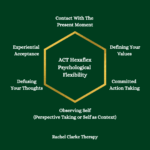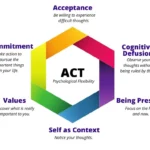In today’s rapid-paced world, we’re continuously striving to enhance and ideal everything in our lives. This pursuit of perfection can often make it difficult to certainly acquire topics as they may be, in particular in terms of ourselves and our instances. Acceptance and Commitment Therapy (ACT) offers an exceptional angle, suggesting that the path to intellectual well-being is not about converting the whole thing but instead studying to simply accept and decide to live because it unfolds. Through mindfulness and value-based actions, ACT permits individuals to live extra pleasant lives with the useful resource of training them to embody their thoughts and emotions in the desire to suffer in opposition to them. This article explores how beauty remedy works and the manner its ideas can bring peace, resilience, and a substantial route to your life.
Acceptance Therapy
Acceptance therapy, often referred to as acceptance and commitment therapy, is one kind of mental health treatment that employs acceptance and mindfulness techniques to support a person in living up to a meaningful life.
- Cognitive Defusion,
- Acceptance,
- Mindfulness,
- Self-as-Context,
- Values,
- Dedicated to Taking Action
They are all interconnected in a way that makes it easier for someone to process what has happened and makes it possible for him to make decisions based on his beliefs. Its objective is to alter one’s response to negative emotions rather than completely eradicate them.
Understanding the Role of Acceptance in Mental Health
Acceptance lies at the very heart of positive mental health. Most mental health issues are struggles against some kinds of unwanted thoughts or feelings in one’s life. By simply allowing one’s self to accept these experiences, a person can avoid such emotional suffering.
For instance, someone who is anxious would put a lot of effort into trying to block out the ideas that are making them anxious. In actuality, the avoidance act model itself could make stress and anxiety already present worse. Through acceptance therapy, people can learn to live with their anxiety without trying to control it. This might paradoxically reduce anxiety over time.
It has been proven by research that this can increase mental health. One study published by the Journal of Consulting and Clinical Act Psychology produced results showing that, in comparison with other participants, those practicing acceptance had lower levels of anxiety and depression.
The Practice of Acceptance Therapy
Acceptance therapy PDF includes act techniques and exercises that will help people easily learn to accept thoughts and feelings. Some common practices are:
Cognitive Defusion
It helps in distancing the individual from his thoughts. Thoughts are seen as mere words or pictures and not facts. For example, a person can be asked to repeat a thought out loud several times that is distressing until it has no meaning and no longer produces distress.
Mindfulness Exercises
It’s about being present and not judging. Through mindfulness in acceptance commitment therapy worksheets, people can carry out exercises that will enable people to observe thoughts and feelings without changing them.
Values Clarification
Knowing what matters in active life physical therapy can guide how you act. Acceptance commitment therapy includes exercises designed to help you figure out what matters to you and to make choices that align with the person you are.
Committed Action
Finally, ACT therapy techniques foster valued action despite difficult emotions. This helps people to lead much more meaningful lives.
Benefits of Acceptance Therapy
Emotional Resilience
One of the key benefits of acceptance-based treatment is enhanced resilience. This is the result of learning to accept one’s emotions. Some people will become less reactive if they can learn to accept their emotions. Being more resilient will enable him to have better mental and overall wellness.
Enhanced Self-Awareness
So, acceptance therapy would increase self-acceptance. With the ability to know about one’s thoughts, emotions, or values, there would be growth to reach personal potential and ultimately guide an individual toward making better decisions.
Improved Relationships
Acceptance therapy would function with relationships by teaching individuals to accept others’ flaws. One will have built much more of a real, full relationship.
Who Can Benefit?
Any individual going through mental health issues, such as anxiety disorder, depression, or stress, will find acceptance and commitment therapy exercise is important. It greatly enhances an individual’s quality of life and living standards according to his values.
Real-life Examples
Sarah’s Story
Years of anxiety reaped havoc with Sarah’s life; she had tried almost every form of therapy in the world but to no avail. The use of acceptance therapy enabled her to accept thoughts no matter how anxiety-provoking they were. Her anxiety lessened, and now she could follow her delight in art.
James’s Journey
The ongoing pain James had been feeling was having a detrimental effect on his quality of life. He learned to accept rather than battle his sorrow via acceptance treatment. That, of course, did not end the pain, but it did lessen it and improve his condition.
Maria’s Transformation
Maria has never felt good about herself. Thanks to the acceptance therapy book, she could endure the sensations without really experiencing them. She is currently working on a community initiative that she feels has more significance since it embodies values she deems important.
How to Incorporate Acceptance Therapy into Daily Life
Practice Mindfulness
Find perhaps five minutes every day to set aside for some mindfulness practice. Reflect on how you breathe, and how you think about life, and bring the focus back in without judging it to here and now.
Accept Your Feelings
Now, if you do feel any painful emotion, just acknowledge it; you’re not supposed to do anything at all to change it. You can remind yourself if you need to that it’s okay to feel this way.
FAQs
Q: Acceptance therapy is intended for people with mental issues only true or false?
A: False. Acceptance therapy is for all who would wish to experience some positive change in their sense of wellness and proceed to live in a manner that is consistent with what is of meaning in one’s life.
Q: Is acceptance therapy meant to eliminate one’s negativity or bad feelings?
A: No, that’s not what acceptance therapy is all about. What acceptance does is that it helps us change how we would react to such feelings. By learning to accept them, they can reduce the control of such emotions in their life.
Q: How long does the treatment normally last?
A: Some benefit within a few sessions, others take a bit longer. It all depends upon the individual circumstances and commitment to practice.
Q: Are acceptance therapy and cognitive behavioral therapy similar in approach?
A: No, while both these therapies have a common target of changing thoughts and behaviors, they go about it differently.
Q: Can I practice acceptance therapy all by myself?
A: Much of acceptance therapy can be self-applied, but it is best done when professional training has been used.
Conclusion
Acceptance therapy is a powerful way to enhance mental health. Much emotional suffering lessens in so doing, as more self-awareness is gained, and life becomes significant due to the acceptance of our thoughts and feelings. It could just turn out very instrumental in questions related to mental health problems or raising general welfare.
Share if you liked this post, and please do so with others that you feel might benefit. You can learn more about acceptance therapy and how it’s going to change your life.









